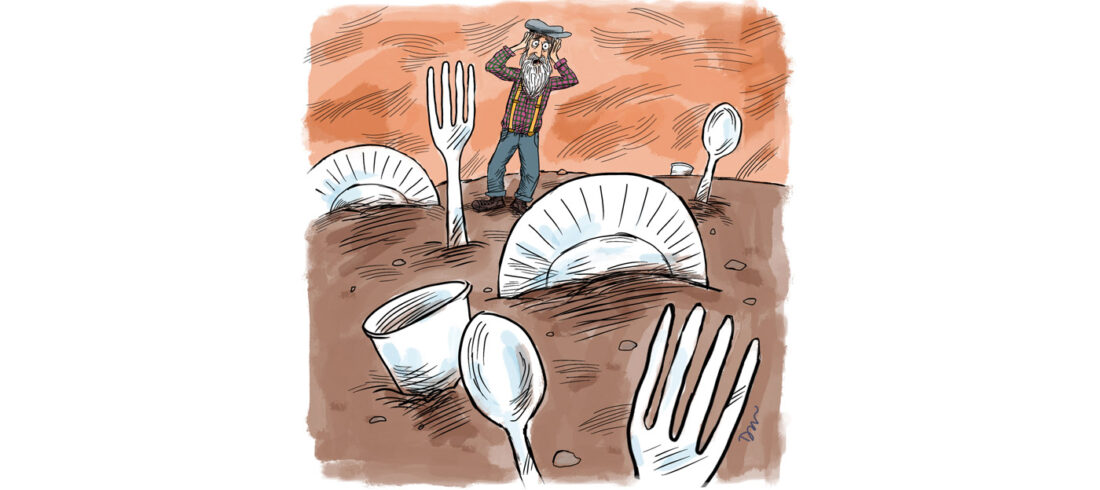Sometimes a great product idea has unforeseen flaws that make it unworkable. Sometimes the product is trying to fill a niche that is better left empty. Compostable eating utensils all fall into that category. The concept of a fork that would go back to the land with the banana peels and apple cores sounded good, but it has not worked — in fact, it has actually made recycling cups, plates, and flatware much more difficult. The outdoor event season, and the wonderful street-food vendors that are common in the summer, often feature “green” “compostable” dishes and utensils that aren’t — but there are simple alternatives that do work.
Most “compostable” packaging is made of corn, but corn that has been chemically manipulated to make it almost as durable as petro-chemical plastics. At the same time, the chemical composition of corn-based plastic is so different from oil-based plastic that mixing the two for recycling turns both into garbage — but the products look so similar to both people and automated sorting machines, the two often get mixed together anyway.

Another problem: These containers actually aren’t compostable in your backyard bin or in commercial composting facilities. Local commercial composters no longer accept the material because despite the heat they are able to generate in their well-regulated facilities, those forks and spoons come out almost unchanged. Thrown in the landfill, the “compostable” plastics sit for thousands of years, or decompose without oxygen, adding to the problem of waste-generated methane. A petro-chemical derived fork, despite its many other problems, at least just sits in the landfill, unchanged.
Finally, the amount of energy used to make the “compostable” material is far higher than that needed to make plastic from oil and natural gas. A lot of fuel is used to grow and fertilize the corn, transport it, and turn it into corn plastic. All these problems are present whether you are talking about a “compostable” cup, fork, or vegetable container. They aren’t sustainable, and greenwashing people into thinking they are just makes our problems worse.
Fortunately there are simple, time-tested, Earth-friendly solutions. Re-usable (notice there are no quotation marks) products are available and being used at events, street carts, and takeout restaurants already. The Oregon Country Fair has used re-usable flatware for years. Food vendors give you a fork or spoon with your meal, and you drop it in a wash bin when you are done so it can be cleaned. They have been experimenting with re-usable cups and bowls, too. The Pickathon music festival in Portland requires attendees (and performers) to purchase a metal plate, bowl, and cup that can be used for food over and over, then taken home to remind you of the good times you had.
Group gatherings in Eugene should follow suit, and stop greenwashing with compostable things that are used once and then thrown away forever. We wish there were sustainable requirements for events and takeout dining, and some progress is being made there, but personal responsibility (who, me?) is a good path to follow to a greener world, too.
Plain paper plates can be used and composted both at home and commercially. The clear “compostable” plastic cups and containers, and the hard “compostable” plastic cutlery are the problems, not plain paper. To cut out a step in the paper plate-making process, palm leaf bowls and cups without a plastic coating are available too. Yes, both paper and palm can get a little soggy if you talk too much before eating, but that food is so good, why are you letting it sit there?
Food production is your second biggest greenhouse gas generator — first if you are bicycling or driving electric. Growing food, transporting it, and throwing it in the landfill is a triple no-no, ending with the landfill methane monster. We wish there were sustainable requirements for events and take-out dining. Some progress is being made, but personal responsibility (who, me?) is a good path to follow to a greener world, too. My Master Gardener group doesn’t allow paper or plastic at potlucks and meetings. Each member brings their own cup, bowl, and cutlery. I bring extras to loan to forgetful folks.
Covid has changed things, but many coffee places are letting you bring your own cup again. If we would bring our own bowls and cups to festivals and street carts, and our own mugs to coffee places, what a wonderful world it would be! (And less trashy too!)


